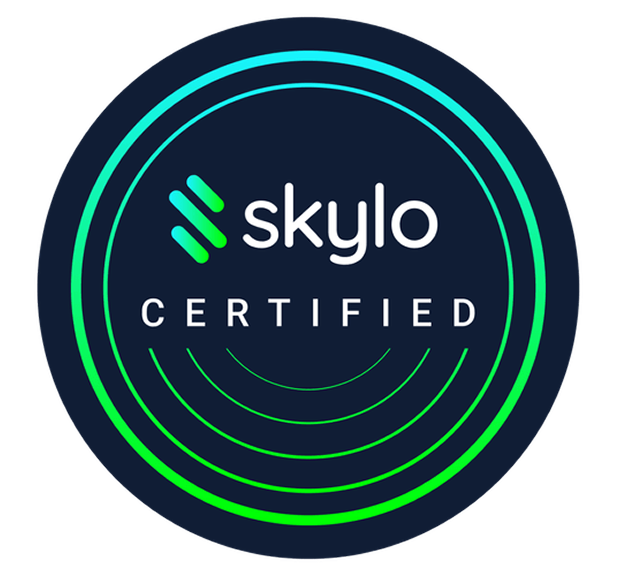
Device Certification
Certify your devices with our commercially available direct-to-device Non-Terrestrial Network. We certify cellular chipsets, modems, modules, and devices to seamlessly work with the Skylo network, typically requiring only firmware-level adaptions to the latest 3GPP NTN standards along with our Standards Plus requirements.
Why Skylo?
Skylo partners with the entire ecosystem of established satellite providers, MNOs, and IoT companies to maximize impact. By working with trusted names in space and technology, we focus on delivering seamless, cohesive connectivity solutions for our customers.
Skylo-certified devices will seamlessly and transparently communicate with the Skylo network.
Established test plans detail exactly what is required to be certified, enabling device manufacturers to streamline the certification process and release products faster.
Enable seamless integration across diverse systems and devices, deliver reliability, security, and scalability across devices. Enhance the user experience, drive innovation, and future-proof your roadmap.
Benefits of Skylo Certification
Why device makers choose Skylo's NTN certification process.







Certification Process
A continuous cycle to ensure devices meet and maintain Skylo’s NTN and Standards Plus compliance.
A device on the Skylo network requires certification to ensure seamless and reliable communication with the Skylo network, as well as compliance to satellite-specific regulatory and partner requirements. Skylo certification verifies compliance with the latest 3GPP Non-Terrestrial Network (NTN) standards and Skylo's "Standards Plus" requirements, which are additional technical specifications to improve functionality, interoperability, and ubiquity. Skylo certification ensures devices are secure, scalable, and compliant with relevant global regulations, enabling faster time-to-market and access to new revenue streams through NTN communication. It also designates the device as "Skylo Certified," which may aid in your marketing endeavors.
There are two aspects to the cost for certification: 1. Skylo Certification costs and 2. Third party lab costs for OTA, GCF/PTCRB, and Regulatory compliance testing. Specific third party lab costs for NTN certification vary according to the device under test and we suggest reaching out to approved 3rd party labs for the exact costs. Skylo accepts certifications from any approved 3rd party labs (SGS, Sporton and Element) for Skylo specific test cases.CTIA OTA, GCF or PTCRB , and other country specific regulations can be done at any approved CTIA, and these are not restricted to Skylo approved test labs. Current standard pricing for Skylo certification is $7,500 for modules and chip-on-board devices, and $4,000 for integrated devices based on Skylo Certified modules.
Certification processes could take a few weeks to a few months, influenced by device complexity, product readiness, and availability of testing facilities. We’ve established test plans that are designed to streamline the process, enabling device manufacturers to release products faster.
Yes, certification can vary based on the target countries or regions due to different regulatory compliance requirements. Devices must comply with regulatory standards like FCC for the US, CE(ETSI) for Europe, and other regional standards such as ISED for Canada. While Skylo's network is global, devices intended for specific geographic regions are required to perform regulatory testing only applicable to those areas. Devices intended for certification on Skylo's network are expected to support all three key operating bands (B23, B255, and B256).
While Skylo's certification process applies to all device types (consumer, IoT, automotive and beyond), there are distinctions in performance requirements. Devices are classified based on their Total Radiated Power (TRP) and Total Isotropic Sensitivity (TIS) performance as either a Type 1 or Type 2. Type 1 devices typically represent IoT devices like fixed asset monitors or industrial asset trackers with higher performing RF systems, as well as the Automotive segment. Type 2 devices represent lower performing devices such as consumer electronics products (e.g., mobile handsets or wearables). Both categories are eligible for network access, but service pricing for type 2 will be relatively higher.
Yes, using a pre-certified module can significantly simplify and accelerate the certification process compared to a chip-on-board (chip-down) design. Pre-certified modules have already undergone many of the necessary RF and functional tests, allowing device manufacturers to leverage these existing certifications. This saves time and reduces the costs associated with extensive testing required for a chip-down design.
Stringent device-level certification is mandated by legal and regulatory bodies (FCC, CE(ETSI), ISED). It is crucial for satellite networks like Skylo's to ensure network stability and safety for all users. Satellite networks operate under a different risk profile than terrestrial networks. A malfunctioning device on a terrestrial network typically causes localized disruptions. However, a misbehaving device on a satellite network can have widespread, catastrophic consequences, potentially impacting an entire continent.
Want to learn more?
Feel free to check out our case studies, our newsroom, or get in touch with us below.
For press/media inquiries, please contact us at press@skylo.tech.
Testing Support








